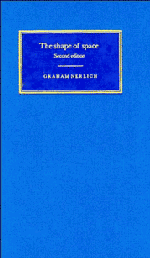Book contents
- Frontmatter
- Contents
- Preface
- Introduction
- 1 Space and spatial relations
- 2 Hands, knees and absolute space
- 3 Euclidean and other shapes
- 4 Geometrical structures in space and spacetime
- 5 Shapes and the imagination
- 6 The aims of conventionalism
- 7 Against conventionalism
- 8 Reichenbach's treatment of topology
- 9 Measuring space: fact or convention?
- 10 The relativity of motion
- Bibliography
- Index
7 - Against conventionalism
Published online by Cambridge University Press: 04 December 2009
- Frontmatter
- Contents
- Preface
- Introduction
- 1 Space and spatial relations
- 2 Hands, knees and absolute space
- 3 Euclidean and other shapes
- 4 Geometrical structures in space and spacetime
- 5 Shapes and the imagination
- 6 The aims of conventionalism
- 7 Against conventionalism
- 8 Reichenbach's treatment of topology
- 9 Measuring space: fact or convention?
- 10 The relativity of motion
- Bibliography
- Index
Summary
Some general criticisms of conventionalism
To begin, notice an unhappy lack of symmetry between conventionalism and classical analytic empiricism. With the exception of some phenomenalists, philosophers have wanted to confine intelligible language within the limits of what is imaginable and meaningful; they did not wish to confine the objective world, which was conceded to be, perhaps, unimaginably rich and various. But there are two reasons for concluding that the non-epistemological conventionalists cannot make these liberal gestures toward the world. Without lapsing into the mud and ooze of a guiding theory of mind, a transcendental psychology, the conventionalist can hardly construe his arguments as limiting what human reason can encompass conceptually, else the conventions are made unintelligible. Further, if the complexity of the world can outrun the complexity of the privileged language, then extensions of language beyond the privileged scope can be regarded as speculative hypotheses about which facts lie beyond the pale of the preferred primitive ones. But then it would be utterly unclear in principle when we are dealing with conventions and when we are dealing with theories about the objective structure of the world. It seems improbable that the facts run out just where we begin to get puzzled philosophically. There is no reason why the facts should not be puzzling, and perhaps every reason why they should be. Conventionalism, then, places limits on what can be in the world and on how the world can be structured. So far as I can see, it must, therefore, be among the most stringent and uncompromising reductive theories in the history of philosophy.
- Type
- Chapter
- Information
- The Shape of Space , pp. 160 - 179Publisher: Cambridge University PressPrint publication year: 1994

